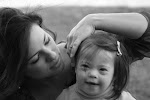I'm often asked the question,
How does one really relate and react to a human being
who has a developmental disability?
And the answer to that question
is to look through the disability
and meet the human being.-a staff member at Camphill California--a community
where adults with developmental disabilities
live, learn and work together--as heard
in the YouTube video AbilitiesHas anyone seen this? Watch it and see what you think. Stick with it. You'll be wondering what is happening at the beginning and where it is going. You might think, "Is this what I can hope for (or should expect) for my child?" There are a few aspects of the video that were tough for me to sort through, and I think most people who watch the clip will have similar thoughts or questions (especially those who have children with a diagnosis).
Please watch, though. Wipe off your own glasses first, and leave your sensitivities behind. This video is a great start to the many conversations we should be having about abilities and how people with cognitive and developmental delays are perceived.
And the above quote from the video is perfect. I love the expression and intention of "looking through the disability to meet the human being"...
*Camphill California is a community where adults with developmental disabilities live, learn and work together. Residents have a variety of diagnoses including Down syndrome, Fragile X syndrome, autism spectrum disorders, and epilepsy.
To learn more about Camphill California visit: http://www.camphillca.org/
To learn more about The Camphill Movement visit: http://www.camphill.org/
All Feeling Better
14 years ago











Thank you for sharing this. I just watched the video. It's good for me to see, I think, even though it's not easy. I don't yet see my daughter's instrument as being defective. Maybe glimpses, but that's all.
ReplyDeleteThat's one of the parts I think people will have trouble with...the analogy to a broken instrument. But I think it was said with right intention--that challenges don't imply worthlessness, and that a diagnosis is not the most important part of a person--and he seems to have great respect and concern for the people at Camphill. I love that it is not a *facility*, but a *community*, with each member contributing to life there.
ReplyDelete